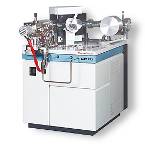GCHEM is a technically innovative company that provides geochemical fingerprinting services to resource companies for identifying the source of in situ and migrating natural gases and oil-field waters. Since 1997, GCHEM’s geoscientists have collaborated with academia, industry and government agencies throughout Western Canada to develop and apply new technology in solving oil-field related problems.
GCHEM is located in Lloydminster, Alberta, Canada in the heart of the Western Canadian Heavy Oil District. In-house analytical facilities include three gas chromatographs including two configured for high-resolution detection of light hydrocarbons. In addition our laboratory includes a state-of-the-art Thermo 253 Gas Combustion — Continuous Flow — Isotope Ratio Mass Spectrometer for measurement of stable carbon and hydrogen isotopic compositions in hydrocarbon gases. These instruments are required for accurate and precise fingerprinting of oil field and environmental fluids.
GCHEM Field sampling crews are trained in oil-field operations, have all safety courses and underground line locating Tech 2 certificates. Three truck-mounted drilling units are ready to service Saskatchewan, Alberta and NE British Columbia for all surface gas migration testing and oilfield fluid collection needs. Specialized flow meters and gas and liquid sampling vessels are available for all production, exploration, remediation and environmental requirements.

Personal
Mr. Bryan Szatkowski is the founder of GCHEM and has over 16 years experience in soil and aquifer gas collection throughout Western Canada, Australia, Papua New Guinea and the United States. Bryan has a B.Sc. in Geology and has extensive experience in developing and modifying field collection equipment and methodologies, and was among the first to commercialize isotope tracing of migrating gases within Western Canada.
Mr. Bradford Johnston has a B. Sc. in Chemistry and is the Operations Manager at GCHEM and has developed many analytical protocols for in-house techniques for detection of light n-alkanes in gases and waters using gas chromatography and stable isotope mass spectrometry.